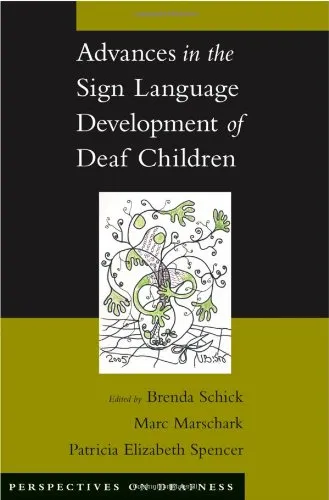Advances in the Sign Language Development of Deaf Children (Perspectives on Deafness)
4.7
Reviews from our users

You Can Ask your questions from this book's AI after Login
Each download or ask from book AI costs 2 points. To earn more free points, please visit the Points Guide Page and complete some valuable actions.Introduction to 'Advances in the Sign Language Development of Deaf Children'
The development of sign language is a pivotal aspect of language acquisition for deaf children. In our book, "Advances in the Sign Language Development of Deaf Children," we delve into the profound intricacies of how deaf children acquire sign language, the factors influencing this process, and its implications for their cognitive and social development. Grounded in comprehensive research, our book provides a thorough exploration of the influences, methodologies, and outcomes related to sign language development among the deaf community.
Detailed Summary
This book is an extensive compendium of knowledge on the developmental pathways of sign language learning in deaf children. It synthesizes contributions from a myriad of experts in the field, who provide insight into the diverse aspects of language acquisition. We examine how sign language serves as both an educational tool and a critical component of identity formation within the deaf community. The book covers a variety of topics, including the neural and cognitive underpinnings of language development, the role of parents and educators, and the impact of early exposure to sign language. This multi-faceted approach ensures a well-rounded understanding of how deaf children can achieve linguistic and cognitive milestones through sign language.
Key Takeaways
- Early exposure to sign language is crucial for optimal linguistic and cognitive development in deaf children.
- Parents and educators play a pivotal role in facilitating sign language acquisition.
- The process of learning sign language is linked to better educational outcomes and social integration for deaf individuals.
- Sign language is not just a tool for communication, but an integral part of cultural identity and community for deaf individuals.
- Insights into the neural mechanisms involved in sign language acquisition reveal the adaptability and resilience of the human brain.
Famous Quotes from the Book
"Sign language is not just a visual translation of spoken words; it is a fully developed linguistic system with its own syntax and grammar."
"In embracing sign language, we are embracing a rich culture and history that is just as comprehensive and beautiful as any spoken language."
"The hands are not just tools of the trade for a sign language user; they are an extension of their thoughts and emotions."
Why This Book Matters
"Advances in the Sign Language Development of Deaf Children" is an essential read for educators, linguists, parents, and anyone interested in the fields of linguistics and deaf studies. It addresses the critical need for acknowledgment and support of sign languages globally, advocating for the educational rights and cultural identity of deaf individuals. The value of this book lies in its ability to bridge the gap between research and practical application, offering evidence-based strategies and insights. This empowers readers to contribute positively to the educational landscape and societal perceptions surrounding the deaf community.
Moreover, the book speaks to a universal audience, underscoring the inherent human capacity for language and communication in all its forms. It enriches our understanding of the diversity of human languages and emphasizes the importance of preserving and nurturing this diversity within a global context.
Free Direct Download
You Can Download this book after Login
Accessing books through legal platforms and public libraries not only supports the rights of authors and publishers but also contributes to the sustainability of reading culture. Before downloading, please take a moment to consider these options.
Find this book on other platforms:
WorldCat helps you find books in libraries worldwide.
See ratings, reviews, and discussions on Goodreads.
Find and buy rare or used books on AbeBooks.
1328
بازدید4.7
امتیاز50
نظر98%
رضایتReviews:
4.7
Based on 0 users review
"کیفیت چاپ عالی بود، خیلی راضیام"


